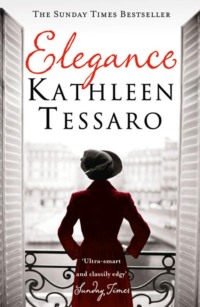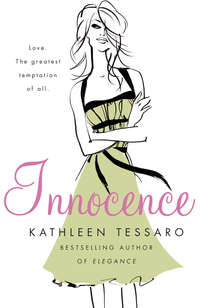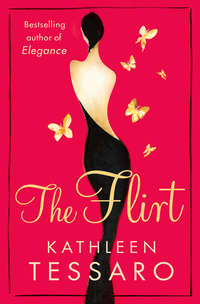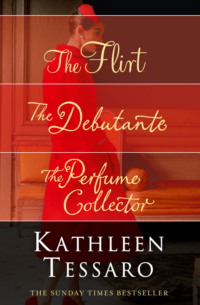
Полная версия
The Perfume Collector
‘I’m sorry,’ Grace interrupted, ‘but I’m not entirely certain I understand. Would you mind explaining everything to me again? Slowly?’
‘Yes, of course. Maybe I’m not being very clear. You see, according to the terms of the will, you’re to have the entire proceeds, minus the transaction fees, of the purchase price of Madame d’Orsey’s property holdings. We’re planning to accept bids from several different leading estate agents and then, with your permission of course, we’ll be able to market it. In addition, a portfolio of stocks also comes into your possession. However, they are being managed elsewhere.’
Grace’s mouth was open but she was unable to close it. ‘I’ve inherited stocks and a … an apartment? In Paris?’
‘Well,’ Monsieur Tissot paused, ‘not quite. The will specifies that you are to receive the proceeds of the sale of the property. It’s my understanding that Madame d’Orsey wanted you to have the funds, rather than the property itself. It was always her intention to provide you with a lump sum for your personal use.’
‘A lump sum? For my use?’ It was unnerving to imagine a stranger planning her future in such detail; even a benevolent stranger.
‘Yes, and quite a considerable one at that.’
‘But surely she didn’t intend for the money to go to me, directly?’
‘On the contrary, that’s precisely what she intended. My understanding was that she wanted you to have financial independence. Le droit de choisir was how she put it. The right to choose.’
Grace felt light headed; her hands were tingling with pins and needles. ‘But not for me, personally. What I mean to say is, am I not inheriting this by default, as it were?’
‘Default?’ He frowned.
‘Yes, I mean, surely this was originally meant for someone else, wasn’t it?’
‘Madame, you are the named recipient in the will.’
‘Are you sure?’
Monsieur Tissot’s frown deepened.
Grace tried to swallow but her mouth felt dry, as if her tongue was made of felt. Financial independence. A lump sum. ‘May I trouble you, Monsieur Tissot, for a glass of water, please?’
‘Of course.’ He went to the door and said something to the secretary.
A moment later, he handed her a glass. ‘Are you quite all right? Your cheeks are white. Perhaps you should lie down, Madame Munroe.’
Grace took a sip. ‘I’m a little tired, that’s all. I’m not used to travelling by myself and this, this has come as something of a shock to me.’
‘Of course.’
‘Did …?’ She stopped; started again. ‘I’m sorry, did you know her? Madame d’Orsey?’ She tried to sound casual.
‘I drew up the will with her. But that was all. She was quite a strong personality. It’s a shame that she died so young.’ His face shadowed with concern. ‘Are you sure you wouldn’t like some time alone? I would be more than happy to leave the room.’
‘No, thank you. I feel better now.’ She put the glass down, forced herself to look him in the eye. ‘Monsieur Tissot, are you quite certain … Is it at all possible that you have the wrong Grace Munroe?’
Monsieur Tissot regarded her warily. ‘Why would you ask that?’
‘Are you certain,’ she repeated, ‘that I am the right woman?’
He reached again for the file, taking out an envelope. He handed it to her. ‘Is this you?’
Grace opened it. There was an old newspaper photograph cut out from the society section of The Times. It showed Grace and two other young debutantes in long white strapless ball gowns, standing on the massive sweeping marble staircase at Grosvenor House. The caption underneath read, ‘Miss Grace Maudley, Lady Sophia Hapswood and Miss Daphne Sherbourne attend the Grosvenor House Ball’. There was also a piece of paper, folded. Grace opened it. It was written in a woman’s handwriting, flowing, slanted letters.
Grace Jane Munroe (née Maudley)
39 Woburn Square
London, NW1
Born: 30 May 1928
Only child of Jonathan and Catherine Maudley of The Great Hall, West Challow, Oxfordshire, England
Grace stared at it.
The words seemed to float, blurring together on the page.
‘Madame Munroe?’
Suddenly the room was too hot; too close. The papers slipped through her fingers, drifting to the floor.
‘Would you be so kind as to call me a taxi?’ she heard herself say. ‘I think perhaps I’m a little unwell after all.’

Monsieur Tissot drove her back to her Hotel. They didn’t bother to talk. Instead, Grace stared out of the window at the winding narrow streets and the people, so much more vivid than in London, pushing in and out of shops and businesses. They seemed to be removed from her by more than just language. French people leading French lives. Why was it that anything you couldn’t readily understand became mysterious and glamorous?
When they pulled up at her Hotel, her hand was already on the door handle, pushing it open. ‘Thank you.’
‘Madame Munroe.’ Monsieur Tissot turned off the ignition and faced her. ‘I don’t mean to be intrusive, however, I’m curious. What was your relationship to Madame d’Orsey?’
‘Well, Monsieur Tissot …’ Grace stiffened, assuming her loftiest tone. ‘I’m … I’m not really certain that it’s any of your business.’
He was disturbingly immune to her rudeness, looking at her with a distinctly French mixture of amusement and indulgence. ‘Of that I’m certain.’
She reached again for the door handle.
‘You’ve never met her,’ he guessed.
Grace glared at him. ‘That’s preposterous!’
‘It is preposterous. However I’m right, aren’t I?’
She frowned, pursing her lips tightly together. She should have taken a cab.
Easing back in his seat, he continued, ‘I’ve overseen countless will readings. Never before have I witnessed a beneficiary as perplexed as you are. Is it true, Madame Munroe?’
Grace hesitated. ‘In a manner of speaking.’
‘So,’ he crossed his arms in front of his chest, ‘you’ve received an inheritance from a woman you’ve never met. Is that correct?’
‘Yes.’
‘A woman, if I’m right, you’ve never even heard of.’
She flashed him a look. ‘How did you know that?’
‘Am I right?’ he asked again, ignoring her question.
‘Yes.’
‘Well then,’ he shrugged, ‘why didn’t you say so?’
‘I … I don’t know,’ she faltered. In her panic, she’d imagined more dramatic consequences – possibly a trip to the local police station or the British Embassy. ‘I wasn’t sure what would happen.’
‘Nothing can happen. The inheritance is yours, regardless of whether you knew her or not. You’ve done nothing wrong.’
‘It feels as if I’m stealing,’ she admitted, loosening her grip on the door handle.
‘It is unusual.’
‘Yes. But she had my name and address; that photograph from the newspaper.’
‘Is she a friend of the family?’
‘I suppose she might have known my parents before they died. Still, what kind of person gives her money to a complete stranger? And what kind of stranger just takes it?’
‘I don’t know.’ The whole idea appeared to interest rather than disturb him.
‘Did she ever explain the bequest to you?’
‘No. I only met her once, when she composed the will. She came through another client of ours, Jacques Hiver.’
‘Hiver?’ Grace repeated, trying to place the name. ‘Where have I seen that name before?’
‘In every chemist’s window in the city. He’s the owner of one of the biggest cosmetics companies in France.’
‘Yes, of course!’
Hiver rouge – the advertisement featured a drawing of a beautiful dark-haired woman, blindfolded with a black silk scarf, wearing the deepest shade of red lipstick. Underneath it read simply, Embrasse-moi – kiss me. She’d noticed it because the image seemed so daring; not at all the type of poster one would ever see in England.
‘So,’ she tried to fit the pieces together, ‘Madame d’Orsey was his wife?’
‘Well, no …’ He looked at her sideways. ‘He passed away earlier this year. His wife is still alive. You see, we didn’t handle Monsieur Hiver’s – how do you put it? – legitimate affairs. He had another, much bigger firm for that. We dealt with those matters that required a more delicate legal approach.’
‘In what way delicate?’
‘I believe she was his mistress.’
‘Oh!’
Grace stared at the cobbled street in front of her. Her first inclination was to judge. And yet it wasn’t so easy, when you were on the receiving end of such generosity.
They sat a moment.
‘Did she give you any indication … any clue when she drew up the will, as to why she was giving the money to me?’
He shook his head. ‘The question never arose. She had the information I showed you, which she handed to me as soon as we began. I don’t recall that we ever discussed any personal aspects of the will. She came fully prepared. I remember being very impressed with how clearly she’d outlined her wishes and how straightforward everything was. Her main concern seemed to be that the assets should be liquidized as quickly as possible. And that you should receive the bequest in person. On your own.’
‘Really?’ That was an odd caveat.
He nodded. ‘If you’d come with someone else, I was to ask that they wait outside.’
‘I see.’ It sent a chill through her to think of the care and planning this stranger had expended on her behalf.
It began to rain a little, a soft misting that settled silently on the windscreen.
‘What did she look like?’ she asked quietly.
‘Very striking, with dark hair. She must have only been in her early forties and she was quite attractive. But one could see that she seemed to be in some sort of pain, and I think it wore on her; it showed in her face.’
Grace continued to stare at the cobblestones, now damp and glistening in the flickering lamplight, as the afternoon drew to a close. ‘I have no idea of what to do.’
‘But there’s no need for you to do anything. I can assure you, the will is perfectly legal and binding. Once you sign the papers, you can simply take the proceeds and return to London.’
‘But how?’ Couldn’t he see how impossible that was? ‘I couldn’t live my life without even knowing who she was or why she gave it to me. It would drive me mad!’
‘Think of it like winning a lottery,’ he suggested.
‘I don’t believe in gambling, Monsieur Tissot. To me, chance isn’t random. The universe is bound by unseen threads. We have only to untangle them a little to see a pattern unfold.’ She turned to face him. ‘Are you certain there hasn’t been a mistake?’
He straightened, clearly irritated at the inference. ‘I can assure you, I’m not in the habit of making mistakes. And I have no evidence that Eva d’Orsey did either. On the contrary, all the information she has provided has been correct so far.’
Grace sighed, running her hand across her eyes. There were no answers, only more questions. Now her head was beginning to ache. ‘I’m completely at a loss. I honestly have no idea of where to begin.’
He thought a moment.
He’d been instructed by the senior partners to deal with this case as quickly and discreetly as possible. They were eager to prevent any scandal that might impact on the remaining Hiver family members. But he hadn’t expected Madame Munroe to be quite so baffled by the situation. And he found her reluctance to simply accept the bequest intriguing. Her insistence to know more hinted at some measure of character; a quality he found increasingly rare these days. And so, despite his instructions, Monsieur Tissot made an unorthodox decision. ‘Well, then.’ He turned on the ignition. ‘You need help,’ he said matter-of-factly.
‘Where are we going?’
‘Madame Munroe, I’d like to be of assistance but I can’t do anything until I’ve had my supper.’ He pulled out. ‘There’s a bistro round the corner.’
She looked at him in surprise. ‘And you’re taking me with you?’
‘Do you have plans?’
‘I … No.’
‘Then it seems the kindest thing to do.’ And for the first time he smiled; a rather surprising, angular grin, punctuated by two dimples. ‘I cannot solve your mystery, but at least I can feed you.’

Monsieur Tissot took Grace to a café with a bistro on one side and a more formal restaurant on the other. The staff seemed to know him there and quickly seated them at a corner table, where they sat, side by side, looking out on to the rest of the room. Grace hadn’t dined alone with a man who wasn’t her husband since her marriage. But perhaps because of the circumstances, or the strangeness of the country, it was easier than she imagined. Monsieur Tissot didn’t seem to require or expect conversation. Instead they sat, watching the other diners – a fascinating occupation in itself.
Grace surveyed the menu. ‘I think I’ll have the ragout de cou d’agneau,’ she decided, closing it.
‘The lamb’s neck stew? Excellent choice.’
‘Lamb’s neck?’ She picked up the menu again.
He grinned. ‘Shall I order for both of us?’
‘Well …’ She scanned the entrées again, searching for something familiar. ‘I’m afraid I don’t have a very sophisticated palate. By French standards, that is.’
‘Well then,’ he leaned back, stretching out his long legs, ‘tell me what you like to eat at home and I will advise you.’
‘Well, I suppose I eat a great deal of … toast.’
‘Toast?’ He cocked his head, as if perhaps he hadn’t heard her correctly. ‘I’m sorry. Out of choice?’
‘The thing is, I’m not used to anything too … too French.’
‘You are in Paris, madame.’
‘Yes, but you know what I mean, don’t you? Dishes with too much flavour?’
‘How can anything possibly have too much flavour?’
‘What I mean is too many strong flavours, like onions and garlic …’
They gazed at each other across a great cultural divide.
Grace gave up; put the menu down. ‘Yes. I trust you.’
The waiter came up and Monsieur Tissot ordered for both of them – salade mixte, poule au pot, and a bottle of vin rouge.
He poured her a glass, passing the bread. And she realized that she was very hungry. Lunch had passed and she’d forgotten about it. She tore off a piece of baguette; it was both crusty and soft, still warm in the centre. It was amazing how something so simple, so basic could be this delicious. And so completely different from its counterpart in England.
‘Who is this woman?’ Grace wondered aloud, devouring the bread. ‘That’s the question. And why on earth is she giving me this money?’
‘Of course,’ he nodded. ‘But what I’d like to know is – what do you propose to do with it?’
She hadn’t considered that, perhaps because she didn’t really believe the money belonged to her.
‘I’m not sure.’ She took a sip of wine.
‘You could buy a new house, travel, collect art, invest …’
‘Perhaps.’ She wasn’t familiar with making financial decisions. ‘I suppose the best thing would be to discuss it with a professional lawyer.’
He folded his hands in front of him. ‘I’m lawyer.’
‘Well, yes, but I need one versed in English law.’
‘Yes but they can only advise you. What would you like to do with it?’ he pressed.
Grace thought a moment. ‘Live, Monsieur Tissot. I’d like to live in great comfort. And peace.’ And then she added, quite to her surprise, ‘With no one to tell me what to do or how to do it.’
He raised his glass. ‘An admirable aspiration!’
‘Are you making fun of me?’
‘No, I’m quite serious. People take for granted what is in fact an art. To live well, to live comfortably by one’s own standards takes a certain maturity of spirit, exceptional character, truly refined taste, and—’
‘And money.’ She tore off another piece of bread.
‘It helps.’
She looked at him sideways. Perhaps it was being in Paris or the bizarre situation but she felt free to ask, ‘Do you live by your own standards?’
He thought a moment. ‘I believe it’s a privilege, madam. One that’s earned through a certain amount of courage and adversity.’
She laughed, shook her head. ‘You haven’t answered my question.’
‘Sometimes,’ he smiled. ‘Sometimes I do and other times I do what’s expected of me.’
It was an oddly frank thing to say; one that, nevertheless, Grace understood. Only she’d never heard anyone say it out loud. He looked away, moving the subject back to safer territory. ‘And where would you live this life of comfort?’
‘I don’t know. Maybe by the sea. But wherever it is, they would make this bread.’
‘And your husband? What does he make of all this?’
He caught her off guard. It was the first time in hours she’d even thought of Roger. And now, to her surprise, she wasn’t certain what to say. ‘My husband?’
‘Yes. What does he think?’
Looking down, she brushed a few crumbs carefully off the tablecloth, ‘I don’t know. The truth is, I haven’t had the opportunity to discuss it with him.’
‘I see.’ He looked as if he didn’t entirely believe this. ‘Well, he’s bound to have some ideas of his own.’
‘Yes, that’s for certain.’
There was a polite silence.
‘There are some magnificent coastlines in the South of France,’ Monsieur Tissot said after a while.
‘Yes,’ Grace agreed, grateful he wasn’t pursuing the subject of her husband. ‘I’ve never been but that’s what I’ve been told.’
The chicken was served in a thick red clay pot with a lid, simmered with vegetables and small new potatoes. Warm and succulent, the meat fell from the bone. It was a simple dish yet filled with subtle layers of flavour. It struck her as lavish and exotic. When Monsieur Tissot explained that it was essentially peasant fare, she was amazed.
‘Chicken in a pot,’ he explained, with a little shrug. ‘You said you wanted something plain.’
‘It’s delicious.’
Customers came and went, some for supper, some just for coffee. The small café was the centre of its own little universe, swirling with its own local population. Everyone seemed to know each other, and to have passionate views they never even considered keeping to themselves. They spoke freely, tossing unsolicited advice and opinions across tables. A family came in, several married couples, a pair of quite nicely dressed elderly women, a pile of young men on their way to a club, a single old man reading the paper, a couple of middle-aged women … They watched and ate and, to Grace’s delight, Monsieur Tissot would occasionally interpret for her.
He nodded in the direction of the two women, now sitting tête-à-tête. ‘They’ve been to the cinema,’ his voice was low. ‘This one says she didn’t like the mother. And the leading man was too fat but had a nice face.’
‘What film was it?’
‘Humm,’ he strained to hear. ‘Marty? Apparently they both cried at the end. And now they’re having a drink to make themselves feel better.’
‘Oh, yes! I want to see that. I’ve heard it’s quite good.’
‘And over there.’ He pointed to an elderly couple involved in a heated discussion – he was shaking his head and she was folding her napkin, planting it firmly on the table, preparing to walk out. ‘He says he thinks the veal is fine. She knows it’s got too many capers and not enough lemon.’
Grace couldn’t believe it. ‘They’re fighting like that about food?’
He nodded.
‘That would never happen in England.’
‘I know,’ he smiled.
Afterwards, since the rain had stopped, he walked her the short distance back to the Hotel.
She stopped outside. ‘Monsieur Tissot, am I correct in assuming from what you’ve said that you have access to Madame d’Orsey’s apartment?’
‘Yes, of course.’
‘And that it’s not been sold yet?’
‘No.’
‘I see.’ Grace folded her arms across her chest. ‘Then I would like to see it, please.’
He hesitated. ‘My instructions were to ensure you were in receipt of the proceeds from the sale. I don’t believe it was ever Madame d’Orsey’s intention that you should visit the property.’
‘Perhaps,’ Grace countered, ‘but without my signature on the power of attorney, there will be no sale. Am I right?’
‘Yeees …’ he said slowly. ‘That’s true.’
‘And this is a situation which requires a delicate legal approach.’
His eyes narrowed ‘You’re quite tenacious, aren’t you?’
‘And I believe you’re stalling.’
Rocking back on his heels, Monsieur Tissot pushed his hands deep into his pockets. She was more resourceful than he’d given her credit for. And she was also intelligent and amusing in a very particular English way. He could easily show her the apartment and still complete this business quickly. ‘Very well, Madame Munroe. What time tomorrow would you like me to collect you?’
New York, 1927

Almost every night there was some sort of party at the Hotel. Many started in the bar then worked their way up into the rooms. But often there were simply outbreaks of dancing and drunkenness which flared up, taking over whole floors without warning like a kind of impromptu orgy. Doors would be propped open, and guests who formerly hadn’t even been on nodding terms gathered in hallways, collecting in doorways, laughing and shouting, music and smoke filling the air. Illegal liquor appeared, bottles were passed; more ice and glasses were in constant demand. Within the hour, cars pulled up outside, from the opposite end of town or the suburbs, laden with fresh recruits; girls piled on each other’s laps, shrieking with delight and young men wearing evening jackets, as if they’d been permanently on call for just such an occasion. Racing past the doorman, they followed the noise like bloodhounds tracking a scent, fearful of missing ‘the best bits’.
The chorus girls were famous for these ongoing revelries; interrupted only briefly by bouts of sobriety and the occasional comatose slumber. The entire cast of the Follies seemed to be condemned to the Sisyphean fate of forever reeling from room to room, floor to floor, searching for the next cocktail, the next dance partner, the next eruption of intensity. The following morning, or more often late in the afternoon, survivors could be found wandering bleary-eyed round the corridors and lobby; girls without shoes and missing their handbags, men clutching car keys, with only the vaguest memory of where they might have parked, politely enquiring as to where they were before heading off again.
Cleaning up after these affairs was far less glamorous. It wasn’t unusual to discover that someone had relieved themselves on the balcony, in a potted palm or an ice bucket; stray stockings and missing undergarments were wound about bedposts, jammed into dumb waiters and stuffed between sofa cushions; pools of vomit attracted flies and cockroaches and, along with blood and lipstick, required intense bouts of scrubbing to remove from the carpet. Almost once a week a body would turn up somewhere, sometimes quite dead looking, but usually in a state of extreme intoxication; a person no one knew or remembered, who was eventually carted off by the police to the local hospital.
At the same time, movie and Broadway stars were apt to manifest like sudden, dazzling apparitions. Douglas Fairbanks, Will Rogers, John Gilbert and W. C. Fields frequently charmed young women in the bar, while Ruth Etting, Marion Davies and Fanny Brice could be glimpsed, wrapped in furs, gliding through the lobby before disappearing into chauffeur-driven cars.
The air itself crackled with undercurrents of possibility. Fame, intoxication, sudden sexual encounters – both welcome and unwelcome – simply materialized, as unstoppable and unpredictable as the weather.







